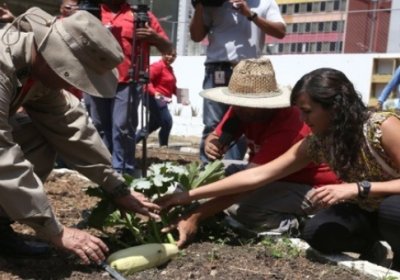Right-wing protests hit the streets of Caracas and other cities across Venezuela — and in some cases turned violent, attacking police and other targets.
The protests were part of a May 18 national day of action to demand that electoral authorities speed up the process of scheduling a recall referendum against left-wing President Nicolas Maduro.
The national mobilisation came after right-wing leader Henrique Capriles gave a press conference on May 17 in which he invoked violence and called for the country's armed forces to “pick a side”.
Venezuela
Venezuelan President Nicolas Maduro has hit out at “mounting aggressions” against his government after it was confirmed that a US plane had twice violated Venezuelan airspace.
The US Boeing 707 E-3 Sentry is reported to have illegally entered Venezuela’s national airspace on May 11 and 13.
Both incursions were detected by Venezuela’s Bolivarian air force and have sparked rumours that the US might be conducting covert spying operations over Venezuela.
“This plane has all the mechanisms to carry out electronic espionage,” said Maduro on his television program on May 17.
Venezuela's socialist president Nicolas Maduro told a crowd of supporters on May 15 that to increase productivity and help alleviate scarcity of basic products facing the South American nation, all businesses and factories closed down by their owners would be seized and handed over to their workers so production could be restarted. “A stopped factory [is] a factory turned over to the people,” Maduro said. “The moment to do it has come, I'm ready to do it to radicalise the Revolution.”
Venezuela's right-wing opposition coalition, the Roundtable of Democratic Unity (MUD), has officially launched its signature collection campaign to force a recall referendum this year against socialist President Nicolas Maduro.
Thousands of opposition supporters flocked to sign the petition in public squares across the country on April 27 after MUD spokespeople confirmed they had received the official go-ahead from Venezuela's National Electoral Council (CNE).
Cuba joined a long list of Latin American countries lending assistance to Ecuador on April 18 by deploying a team of 53 health and rescue specialists to treat victims wounded in the devastating 7.8 earthquake that struck the Andean nation April 16, TeleSUR English said. The quake has killed at least 350 people and injuring thousands more.
 Photo: Venezuelanalysis.com.
Venezuelans took to the streets on April 14 to protest a new housing law proposed by the new right wing-controlled assembly that seeks to privatise public housing.
TeleSUR correspondent in Caracas Iain Bruce reported: “Government supporters are protesting against a law passed by parliament to allow public housing to be sold.”
Photo: Venezuelanalysis.com.
Venezuelans took to the streets on April 14 to protest a new housing law proposed by the new right wing-controlled assembly that seeks to privatise public housing.
TeleSUR correspondent in Caracas Iain Bruce reported: “Government supporters are protesting against a law passed by parliament to allow public housing to be sold.”
 Photo: Albaciudad.org.
The Venezuelan Supreme Court unanimously ruled on April 11 that a controversial “amnesty law” passed by the country's right-wing opposition-controlled parliament is unconstitutional, Venezuela Analysis said the next day.
Photo: Albaciudad.org.
The Venezuelan Supreme Court unanimously ruled on April 11 that a controversial “amnesty law” passed by the country's right-wing opposition-controlled parliament is unconstitutional, Venezuela Analysis said the next day.
 Members of Commune Alberto Lovera in Anzoategui state taking part in their communal fishing enterprise. Photo from Venezuela Analaysis.
Members of Commune Alberto Lovera in Anzoategui state taking part in their communal fishing enterprise. Photo from Venezuela Analaysis.
 A recent poll conducted by Hinterlaces, a well-known and usually reliable Venezuelan pollster, showed that Venezuelans, by a substantial majority, oppose neoliberal solutions to their country’s crisis.
The poll was based on 1200 interviews in the country as a whole between January 11 and 17. The poll has a 95% level of accuracy and a 2.7% margin of error.
A recent poll conducted by Hinterlaces, a well-known and usually reliable Venezuelan pollster, showed that Venezuelans, by a substantial majority, oppose neoliberal solutions to their country’s crisis.
The poll was based on 1200 interviews in the country as a whole between January 11 and 17. The poll has a 95% level of accuracy and a 2.7% margin of error.
United States President Barack Obama renewed an executive order, first issued a year ago, on March 3 that declares Venezuela “an unusual and extraordinary threat to the national security and foreign policy of the United States”, TeleSUR English said the next day.
The order allows the US government to impose sanctions on Venezuela. In protest, Venezuela has withdrawn its charge d'affaires, Maximilian Arvelaez, from the United States, TeleSUR English said on March 9.
Peace, unity and prosperity was the message on March 5, which marked the third anniversary of the death of Venezuela's late socialist president Hugo Chavez.
A 100-day Plan for urban agriculture started on February 28 in eight Venezuelan cities in a bid to provide about 1300 people with vegetables and fruits.
Urban agriculture minister Lorena Freitez said one of the plan's objectives consists of teaching people how to cultivate and stir their interest for agriculture.
In the long term, the products should be able to supply about 20% of the total food consumption of the residents living in the eight participating cities: Barcelona, Barquisimeto, Caracas, Los Teques, Maracaibo, Maracay, Mérida y Valencia.
- Previous page
- Page 25
- Next page






